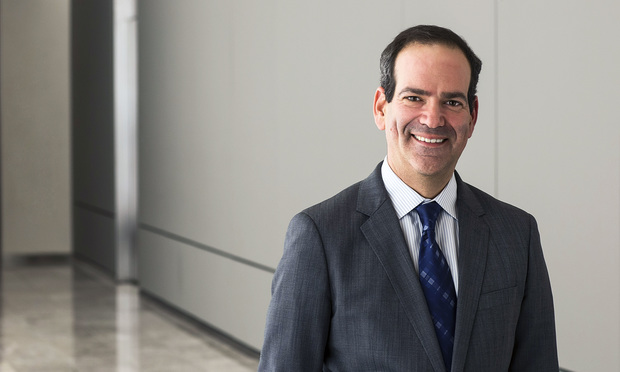'It's Going to Be Extraordinary': Predictions and Advice From Neil Barofsky for Coronavirus Recovery Oversight
"The potential number of companies or recipients is vast, to put it mildly, which makes certain things more important and certain things very different," Jenner' & Block's Neil Barofsky, former special inspector general under the Troubled Asset Relief Program, says. "It's going to be extraordinarily important what processes and procedures surround the determination of who gets money and who doesn't."
March 27, 2020 at 02:40 PM
12 minute read
The original version of this story was published on National Law Journal
 Neil Barofsky of Jenner & Block. Courtesy photo
Neil Barofsky of Jenner & Block. Courtesy photo
In an election year marked by bitter partisan rancor, the coronavirus outbreak brought Democrats and Republicans into agreement this week on a $2 trillion stimulus designed to undergird an economy devastated by the ongoing global health crisis.
On the U.S. Senate floor, Majority Leader Mitch McConnell likened the relief package to a "wartime level of investment into our nation," a testament to the high stakes of responding to a global pandemic that has claimed thousands of lives and upended everyday life. On Friday, as the United States emerged as the country with the most detected cases of the coronavirus in the world, the House followed the Senate and passed the stimulus package.
With President Donald Trump's signature, the relief measure will go down as the largest emergency spending program in the nation's history, but it is not entirely without precedent. In an election year more than a decade ago, Congress passed the Troubled Asset Relief Program, a multibillion-dollar bailout to prop up banks in the financial crisis.
In drafting the coronavirus relief bill, Congress appeared to turn to TARP, borrowing language that created oversight stimulus and bailout funds. Just as TARP did in 2008, the coronavirus stimulus calls for creating a special inspector general. The presidentially appointed watchdog will be tasked with overseeing the Treasury Department's spending in the pandemic recovery and issuing regular reports.
It is an extraordinary role, requiring the special inspector general to start up what amounts to a new mini-agency with a statutory shelf life of five years. In an interview this week, Neil Barofsky, who served as the special inspector general under TARP, recalled early struggles acquiring trash bins, not to mention hiring hurdles and headbutting with the Treasury Department.
Barofsky, now a partner at Jenner & Block in New York, shared insights into a role the likes of which only he has personally experienced in recent memory. As he works from home on Long Island, he has found himself yearning for the challenges of monitoring billions in government spending over the "nightmare" of homeschooling his elementary school-age children.
"This is no fun at all," he said.
The conversation below was edited for length and clarity.
NLJ: Thanks, first of all, for making time to relive your special inspector general days, Neil. As you look back at TARP and the oversight provisions tucked into the coronavirus stimulus, what parallels and differences stand out to you?
Neil Barofsky: What's similar from the oversight perspective is that, when you look at the primary oversight bodies for the Treasury fund, which is about $500 billion of the overall package, it's pretty much a direct lift-out from the TARP legislation. TARP had a special inspector general and a congressional oversight panel. This one has a special inspector general, newly created as in TARP, dedicated solely to this effort, just like the TARP. This one has a congressional oversight "commission," instead of a "panel." So I think that's maybe one of the few material differences—the name of the congressional part of it.
Structurally, you have similar entities being created from scratch. And now the question is who's going to populate the organizations, because that makes a big deal. Who they find to be the special inspector general, who they find to chair and be on the congressional oversight commission, is really going a long way to determine how effective they are and their potential for effectiveness.
Do you foresee any legislative tweaks being needed for the special inspector general's office?
Like what we had, the legislation is incomplete as far as giving these oversight bodies, particularly the special inspector general, a chance to succeed. Little things, like how to staff up an office from zero to 60 or 80 or 100 while also having a 60-day report and as it currently exists, having no extraordinary hiring authority. That's just impossible. That's something that's going to have to get fixed, because it's not easy to get people to come to work in a temporary agency, even if it's part of a national crisis. You're going to see a lot of those mechanical and infrastructure questions that are going to have to get addressed by Congress pretty quickly.
This is an extraordinarily trying time, and the coronavirus crisis has left virtually no corner of the economy untouched. How do you think the challenges for the special inspector general will compare to what you faced in the recovery from the financial crisis?
The challenges that they're going to have are going to be both similar and different. In some ways, we had it a little bit easier, because the primary beneficiaries of TARP in the early days were banks. There's a finite number of banks, and the criteria [for receiving federal funds] were pretty clear, and they're regulated entities. And so, like this one today, that one had an application process where institutions seeking to be the beneficiary of loans or investments would approach the Treasury Department, submit an application, and you would have a process by which the Treasury would make the yay or nay decision and award the funds.
Here, the potential number of companies or recipients is vast, to put it mildly, which makes certain things more important and certain things very different. It's going to be extraordinarily important what processes and procedures surround the determination of who gets money and who doesn't. The mechanics of this are going to be so vast and so huge that, from an oversight perspective, it's a very different process. We could look at every bank application if we wanted to. There's no way an oversight entity is going to be able to look at every loan. It will be one that will be more process-oriented than individual institution-oriented. The inspector general and [congressional] oversight panel is going to have to spend a lot of time on the process—to make sure it's fair, to limit the opportunities for abuse.
The coronavirus stimulus calls for the president to appoint a "special inspector general for pandemic recovery." What considerations should go into that appointment?
Getting the right person is important because, on the one hand, you can't have somebody who's so rigid and so dogmatic that they reject everything that the department is proposing as being not safe. That's not good. On the other hand, you have to have some steel in your spine. When I would push for something that I thought was pretty obvious, the go-to move at the Treasury Department would be to tell me, "If we did that, you'd destroy the program and destroy the entire banking system." I can't tell you how many times I was told that. That is a very significant statement. So you have to take it very seriously, but you also just can't be enslaved by it and scared of it, because then you wouldn't be doing your job and nothing would happen.
So you have to figure out where to go, and that's not easy, and it causes many, many sleepless nights when you do things that you're told are going to destroy the entire banking system, and you better be pretty damn sure. That's the really tough job of oversight. You have to have conviction, you have to do your research, you have to make sure you're right. But when you're right and you know you're right, you have to stand up. It's a really hard job, for whoever's going to get it. It's going to be extraordinary. I wish them luck.
Digging deeper into that, what qualifications do you see as necessary with the special inspector general this time around, under the circumstances we're under today?
You have to have someone who's self-aware of their own limitations and can hire the people who are necessary to fill out, because no one is going to have the expertise to check every box for a job like this. So what you really need is very smart people. Character and personality is extraordinarily important, a deep level of experience in certain areas if not all areas is important, because ultimately you're going to have to go toe-to-toe on these issues with, potentially, treasury secretaries. If you don't have the confidence because of your experience to draw on, it's going to be really hard.
This inspector general essentially has to run a newly formed government office for five years. What kind of work do you foresee this office and this stimulus creating for the legal industry?
Just like this bailout is going to hit every part of the economy, it's going to hit every part of the legal community, as well. At SIGTARP [the Office of the Special Inspector General for the Troubled Asset Relief Program], we generated a lot of investigative work. And so I would assume this oversight body will similarly be triggering investigations related to their duties. There's going to be a whole world of new regulations that are going to be passed and policies that are going to be adopted in connection with this program that are going to have to be analyzed. Law firms are going to have to help companies make their applications, they're going to have to help them make sure their compliance function is up to snuff to deal with whatever requirements are going to be pushed out. No company is going to want to take money from the government and later be found out to not be in compliance with the terms the government sets for that bailout. That would be a public relations disaster.
 U.S. Sen. Elizabeth Warren, D-Massachusetts. Credit: Diego M. Radzinschi / ALM
U.S. Sen. Elizabeth Warren, D-Massachusetts. Credit: Diego M. Radzinschi / ALMAs you mentioned earlier, TARP created a congressional "panel" that was led by now-U.S. Sen. Elizabeth Warren. What was the interplay like, in your experience, between the special inspector general's office and the congressional oversight entity?
A lot of it is driven by personality and personnel. So, I had SIGTARP and Elizabeth Warren had the congressional oversight panel. To be honest, the Treasury Department really tried to play us against each other early on and tried to sow divisions. We decided we were not going to have any of that, so we sat down for a series of lunches and conversations and really looked for ways to collaborate and work together. There are turf battles in government. There are jealousies and big personalities and big egos that exist. And, I guess, when you're talking about me and Sen. Warren, we certainly would be described as having big personalities and perhaps not the most modest of egos. It was important for us to work it out and to have a good, collaborative relationship, because we knew one-plus-one equals three and that by dividing and conquering and seeing where we could complement each other and leverage each other, it would be better for the country. That would be a piece of advice I'd have for the leaders of those two entities.
What do you foresee as making the difference between success and failure for the pandemic response? What are you looking out for?
These guidelines and procedures that the Treasury is going to be pushing out and the programs that the Federal Reserve is going to be announcing. Those are the details where the devils will live and the angels will live. This story hasn't even begun to be written. So much of this was deferred and allocated to the Treasury and Federal Reserve. There's a lot, a lot of discretion that's going to be exercised. And that's going to be where this succeeds or fails, whether it's looked back on as government at its best or a hopeless morass of corruption. What the oversight entities can do, more than anything, is provide that bright, bright shining light of transparency, because that is what will keep the government honest. It will keep the participants honest. It will ensure accountability and transparency. It really does give the programs the best chance of success.
These are trying times, but I was hoping to end with a note of levity. Since we're talking about the coronavirus crisis and the stimulus tied to it, how are you coping with the new normal of working from home?
I've learned two things that I often suspected about myself but never quite knew. One is that teachers are heroes beyond heroes. And second, I would be a terrible, terrible teacher, because homeschooling is a nightmare: trying to teach a second-grader and a fourth-grader when you're not good at that. The skills of being a special inspector general or a partner at a law firm are not easily transferred to homeschooling children. I like to think that I treat my associates with great respect and deference. But you cannot treat a second-grader like an associate, I can assure you, when you're trying to homeschool them. This is no fun at all. It is more stressful than my job ever is. I yearn to be a special inspector general, living in the basement of the Treasury Department, sitting over open sewage, unable to find a garbage can, than to try to go through writing and math with my second-grader.
NOT FOR REPRINT
© 2025 ALM Global, LLC, All Rights Reserved. Request academic re-use from www.copyright.com. All other uses, submit a request to [email protected]. For more information visit Asset & Logo Licensing.
You Might Like
View All
Law Firms Look to Gen Z for AI Skills, as 'Data Becomes the Oil of Legal'

Law Firms Expand Scope of Immigration Expertise Amid Blitz of Trump Orders
6 minute read
Latest Boutique Combination in Florida Continues Am Law 200 Merger Activity
3 minute read
Incoming Howard University Law Professor Kiah Duggins Among DC Plane Crash Victims
Law Firms Mentioned
Trending Stories
- 1Uber Files RICO Suit Against Plaintiff-Side Firms Alleging Fraudulent Injury Claims
- 2The Law Firm Disrupted: Scrutinizing the Elephant More Than the Mouse
- 3Inherent Diminished Value Damages Unavailable to 3rd-Party Claimants, Court Says
- 4Pa. Defense Firm Sued by Client Over Ex-Eagles Player's $43.5M Med Mal Win
- 5Losses Mount at Morris Manning, but Departing Ex-Chair Stays Bullish About His Old Firm's Future
Who Got The Work
J. Brugh Lower of Gibbons has entered an appearance for industrial equipment supplier Devco Corporation in a pending trademark infringement lawsuit. The suit, accusing the defendant of selling knock-off Graco products, was filed Dec. 18 in New Jersey District Court by Rivkin Radler on behalf of Graco Inc. and Graco Minnesota. The case, assigned to U.S. District Judge Zahid N. Quraishi, is 3:24-cv-11294, Graco Inc. et al v. Devco Corporation.
Who Got The Work
Rebecca Maller-Stein and Kent A. Yalowitz of Arnold & Porter Kaye Scholer have entered their appearances for Hanaco Venture Capital and its executives, Lior Prosor and David Frankel, in a pending securities lawsuit. The action, filed on Dec. 24 in New York Southern District Court by Zell, Aron & Co. on behalf of Goldeneye Advisors, accuses the defendants of negligently and fraudulently managing the plaintiff's $1 million investment. The case, assigned to U.S. District Judge Vernon S. Broderick, is 1:24-cv-09918, Goldeneye Advisors, LLC v. Hanaco Venture Capital, Ltd. et al.
Who Got The Work
Attorneys from A&O Shearman has stepped in as defense counsel for Toronto-Dominion Bank and other defendants in a pending securities class action. The suit, filed Dec. 11 in New York Southern District Court by Bleichmar Fonti & Auld, accuses the defendants of concealing the bank's 'pervasive' deficiencies in regards to its compliance with the Bank Secrecy Act and the quality of its anti-money laundering controls. The case, assigned to U.S. District Judge Arun Subramanian, is 1:24-cv-09445, Gonzalez v. The Toronto-Dominion Bank et al.
Who Got The Work
Crown Castle International, a Pennsylvania company providing shared communications infrastructure, has turned to Luke D. Wolf of Gordon Rees Scully Mansukhani to fend off a pending breach-of-contract lawsuit. The court action, filed Nov. 25 in Michigan Eastern District Court by Hooper Hathaway PC on behalf of The Town Residences LLC, accuses Crown Castle of failing to transfer approximately $30,000 in utility payments from T-Mobile in breach of a roof-top lease and assignment agreement. The case, assigned to U.S. District Judge Susan K. Declercq, is 2:24-cv-13131, The Town Residences LLC v. T-Mobile US, Inc. et al.
Who Got The Work
Wilfred P. Coronato and Daniel M. Schwartz of McCarter & English have stepped in as defense counsel to Electrolux Home Products Inc. in a pending product liability lawsuit. The court action, filed Nov. 26 in New York Eastern District Court by Poulos Lopiccolo PC and Nagel Rice LLP on behalf of David Stern, alleges that the defendant's refrigerators’ drawers and shelving repeatedly break and fall apart within months after purchase. The case, assigned to U.S. District Judge Joan M. Azrack, is 2:24-cv-08204, Stern v. Electrolux Home Products, Inc.
Featured Firms
Law Offices of Gary Martin Hays & Associates, P.C.
(470) 294-1674
Law Offices of Mark E. Salomone
(857) 444-6468
Smith & Hassler
(713) 739-1250








